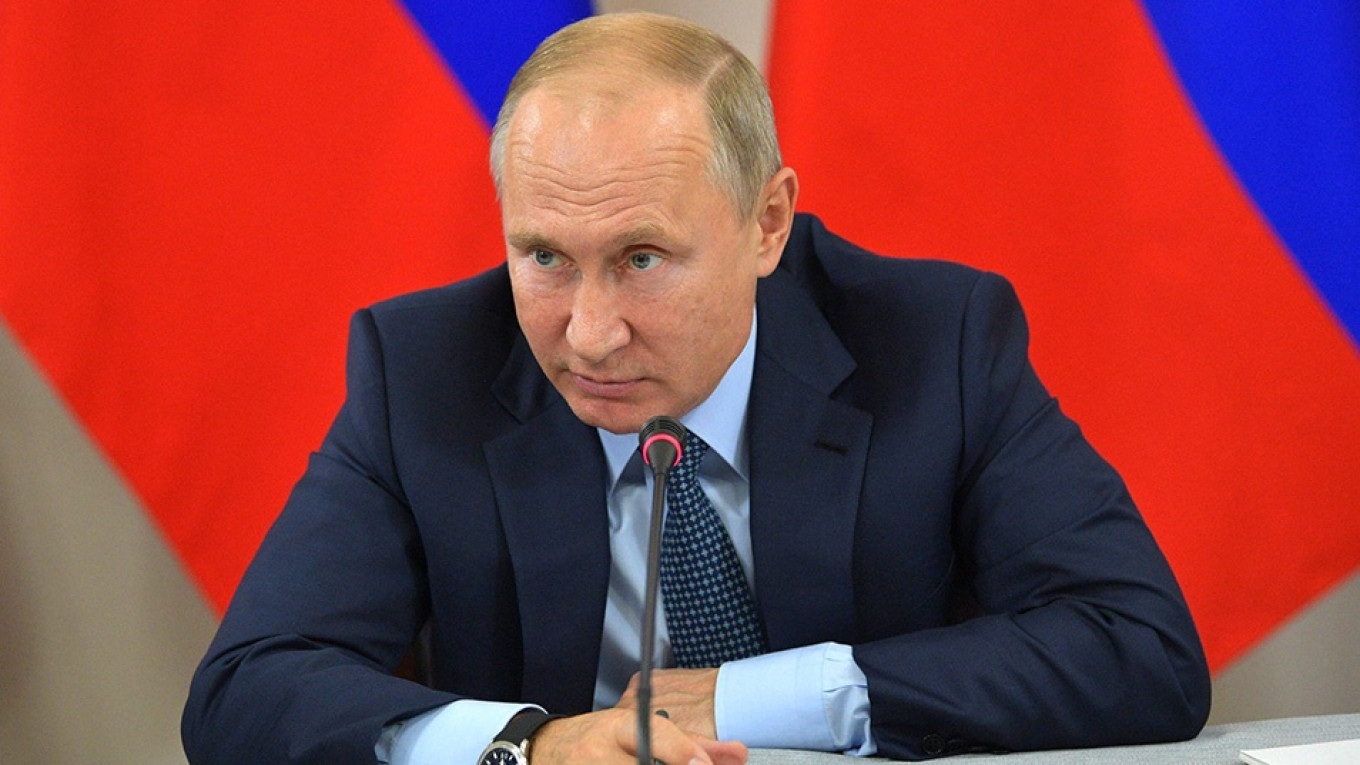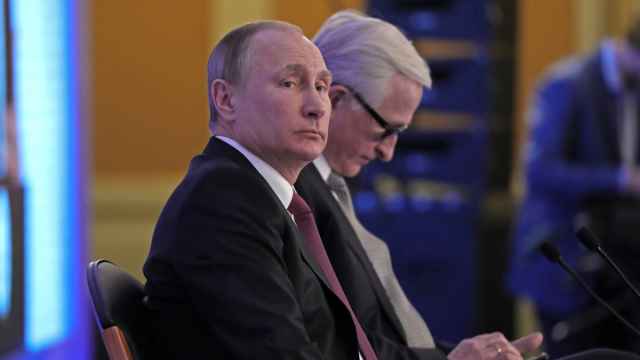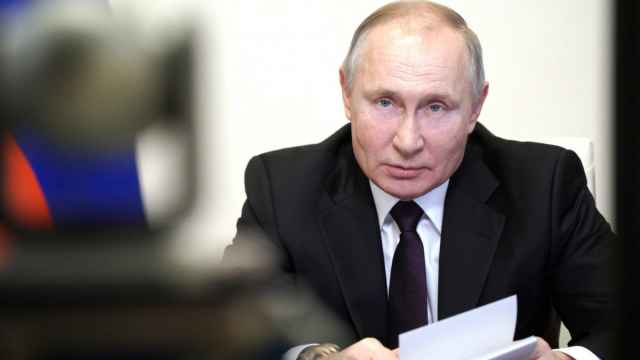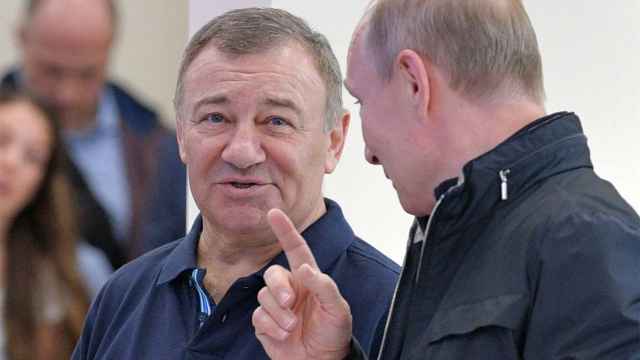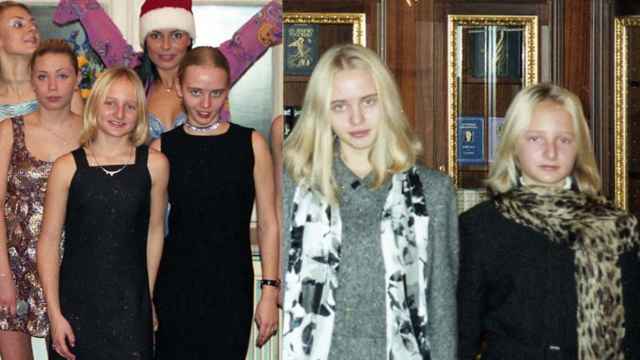Not even all of Russian President Vladimir Putin’s allies in Moscow understand why he pushes ahead so stubbornly with baiting the U.S. and its European allies, an activity that has started to look grotesque in light of recent intelligence failures. There is, however, one potential upside to the strategy, if one can call it that: It forces Russians who’ve moved their capital overseas to consider repatriating it. That’s one of Putin’s oldest strategy goals.
On Wednesday, Alexei Kudrin, Putin’s former finance minister and currently head of the Audit Chamber, Russia’s budgetary watchdog, described escalating Western sanctions as a major threat to Russia’s growth that could even lead to a recession next year. “That, of course, is a big challenge to all of the president’s goals,” Kudrin said. “We have no such global problems for Russia, no such military and political risks that would require increasing tensions with other countries.”
Until recently, the conflict with the West helped Putin maintain a high popularity rating. Now the euphoria that followed the 2014 Crimea annexation is gone, and confrontation with the U.S. and European nations is no longer helping. According to a September poll by the Levada Center, one of the few remaining independent pollsters in Russia, trust in Putin was down to 39 percent compared with 59 percent in November 2017.
There could be any number of reasons why Putin continues with a policy that does no one, including himself, any good: The Russian leader’s machismo, the lack of face-saving solutions to crises caused by aggression in Ukraine and ham-handed actions of Russian spies, the inertia of escalation, even an erosion of Putin’s control over Moscow’s warring enforcer clans. But only one explanation makes sense from a rational point of view: Putin doesn’t mind pushing Russia toward greater economic isolation if an increasingly toxic climate for Russians in the West leads to repatriation of capital exported from Russia since the early 1990s.
Presumably, that’s quite a lot of money. In a 2017 paper, Filip Novokmet, Thomas Piketty and Gabriel Zucman estimated the offshore wealth held by Russians at about three times Russia’s official foreign reserves, or about $1 trillion at the time of publication.
“There is as much financial wealth held by rich Russians abroad — in the United Kingdom, Switzerland, Cyprus, and similar offshore centers — than held by the entire Russian population in Russia itself,” they wrote. Net private-sector capital outflows tracked by the Russian Central Bank add up to a total of $613 billion. Both estimates sound plausible if one considers that the cash and direct foreign investments attributable to the 24 Russian billionaires tracked by the Bloomberg Billionaires Index add up to about $115 billion.
Bring it home
Trying to get the money back is one of Putin’s oldest and least successful projects. In 2002, he called on Russian businesspeople to repatriate their offshore investments to protect them from Western governments: “Otherwise you’ll be swallowing dust trying to get your property back through the courts.”
No one listened for years: Western economies loved the Russian cash. In 2014, as the U.S. and the European Union began imposing Ukraine-related sanctions on Russia, a record of $160 billion was moved out of Russia by the financial and non-financial sectors combined. The consensus among wealthy Russians was that as the country turned inward, the West would still welcome them and their money.
Putin and the Russian government wouldn’t give up, however. Measures aimed at capital repatriation are arguably one of the most coherent of Russia’s current economic policies, along with fiscal and monetary stabilization. In 2015 and 2016, the government offered a financial amnesty to Russians who declared their foreign assets and allowed them to transfer the cash to Russia tax-free. Again, barely anyone took up the offer. According to First Deputy Prime Minister Anton Siluanov, a mere 7,200 declarations were filed. The government hasn’t reported how much money was repatriated, probably because it was negligible.
This year, the amnesty was revived with additional incentives. Up until March 2019, Russians closing their offshore companies can move their assets to Russia tax-free with a guarantee that their previous tax-avoidance schemes won’t be investigated. In addition, Russia has created two “special administrative districts” on islands close to Vladivostok and Kaliningrad, the country’s easternmost and westernmost big cities. These areas provide tax advantages to holding companies, something Russian business sought outside the country, setting up holdings in Ireland, the Netherlands, Cyprus and on various remote islands.
At the same time, Putin’s business ombudsman, Boris Titov, has been running a propaganda campaign among Russian businessmen who have fled to the West fearing all kinds of reprisals in Russia. He’s been offering them his — and Putin’s — help in clearing their names if they come home. About 40 people are on Titov’s so-called London List, and he hopes to bring 10 of them to Russia by the end of the year. So far, the program has been slow to take off: Only four people have returned, and some of them aren’t completely out of legal trouble.
Trust problem
This time around, Putin has a better case for returning wealth to Russia than ever before. That’s a direct consequence of the recent intelligence failures, which make Russians living or keeping money overseas feel unsafe regardless of their political preferences.
One of the London List returnees, Sergei Kapchuk, who had received political asylum in the U.K., became convinced he was in a greater personal danger from U.K. intelligence than from anyone in Russia. That’s an isolated case, but being hunted by Russian goons in the West is scarier for some Russian exiles than trying to deal with their problems at home under Putin’s gaze.
Even to Russian billionaires who don’t fear for their life and liberty, the West has been inhospitable. This year, Roman Abramovich lost his U.K. visa, Suleiman Kerimov faced money-laundering charges in France, and Viktor Vekselberg and Oleg Deripaska have been hit with U.S. sanctions that have disrupted their businesses. All four belong to Russia’s top 20 wealthiest people, according to Forbes Russia.
Some of the Russian super-rich are still fighting to keep operating in the West. Kerimov beat the French charges in court. Mikhail Fridman, a Russian billionaire who was forced by U.K. regulators to sell off some North Sea oil investments in 2015, is merging his and his Russian partners’ European energy investments into a joint company with Germany’s BASF. The Russians will have a minority stake in the company with sales of more than $5.4 billion, and BASF’s political clout is likely to protect them from further regulatory trouble.
It is, however, too late for billionaires already hit with sanctions. The government expects Deripaska to be one of the first big clients of the new Russian offshore zones.
There’s also evidence that some wealth is being quietly repatriated by wealthy Russians whose names are less well-known than those of the billionaires. Russian private banks, in particular the one set up by state-controlled Sberbank, the nation’s biggest lender, have reported quick growth as clients transfer assets from Europe; Sberbank Private Banking’s assets almost tripled in the year to June 2018. “Foreign” investment from offshore areas traditionally favored by Russian business has returned after a dramatic slump pushed it into negative territory in 2014 and 2015.
And yet there’s no evidence in Russia’s balance-of-payment statistics of a massive cash repatriation. Moreover, the data show a continuing capital outflow — not at the panicky rate of 2014, but higher than in the 1990s and 2000s. The Ministry of Economic Development recently had to increase its capital flight forecast for this year to $41 billion from the previously expected $18 billion.
Even with Russian money increasingly unpopular in the West, moving it to Russia requires a leap of faith. Putin’s flagging popularity and uncertainty about his future moves, especially given a continuing escalation with the West, don’t do much to inspire confidence. The difficulty of bringing back the London List exiles is evidence that the Russian law-enforcement system is still predatory, and the number of criminal cases against entrepreneurs keeps growing.
Is it worth it?
Putin may hope that further hostilities with Europe and the U.S. will leave wealthy Russians no choice but to repatriate their capital. The aggressive Russian intelligence presence in Europe would then kill two birds with one stone, making everything Russian appear toxic and putting pressure on the emigre community. But if that’s Putin’s plan, it makes little economic sense.
The offshore capital may have been a big deal when Russia was a poorer country. Now, though, it’s a large economy that absorbs too much money for the offshore cash to make a big difference even if the pace of repatriation picks up. Last year, according to official statistics, 165.7 trillion rubles ($2.5 trillion) was invested in the Russian economy. This includes every type of direct and financial investment except that of banks, pension funds, insurance companies, the government and small business; if all the outflows recorded by the Central Bank came back, they’d be enough for three months of investment at last year’s rate.
Most of the money comes from domestic and, in the case of portfolio investments, legitimate foreign investors, who hold a quarter of Russia’s domestic debt and more than 40 percent of its foreign-currency-denominated obligations. If these foreigners divest under threat of tougher sanctions, even successful capital repatriation won’t make up for the loss of capital.
In the absence of better options, the Russian government is forced to keep increasing incentives for repatriation. But there’s no substitute for economic openness, the rule of law, and good relations with neighbors when it comes to boosting investment and, with it, growth. Under Putin, all three are looking increasingly remote.
Leonid Bershidsky is a Bloomberg Opinion columnist covering European politics and business. He was the founding editor of the Russian business daily Vedomosti and founded the opinion website Slon.ru. The views expressed in opinion pieces do not necessarily reflect the editorial position of The Moscow Times.
A Message from The Moscow Times:
Dear readers,
We are facing unprecedented challenges. Russia's Prosecutor General's Office has designated The Moscow Times as an "undesirable" organization, criminalizing our work and putting our staff at risk of prosecution. This follows our earlier unjust labeling as a "foreign agent."
These actions are direct attempts to silence independent journalism in Russia. The authorities claim our work "discredits the decisions of the Russian leadership." We see things differently: we strive to provide accurate, unbiased reporting on Russia.
We, the journalists of The Moscow Times, refuse to be silenced. But to continue our work, we need your help.
Your support, no matter how small, makes a world of difference. If you can, please support us monthly starting from just $2. It's quick to set up, and every contribution makes a significant impact.
By supporting The Moscow Times, you're defending open, independent journalism in the face of repression. Thank you for standing with us.
Remind me later.



